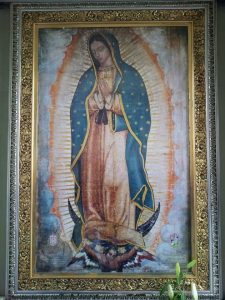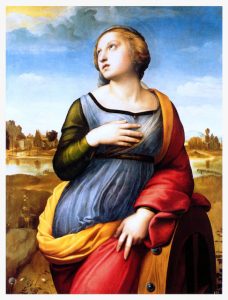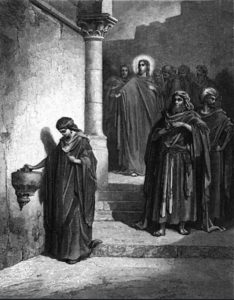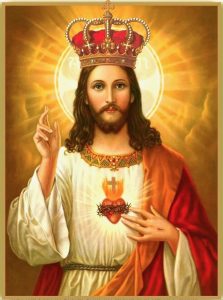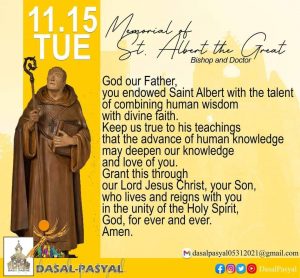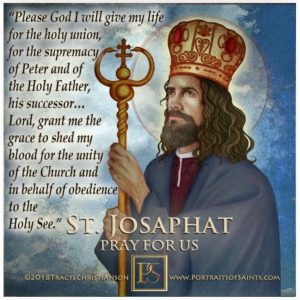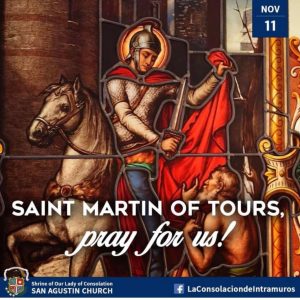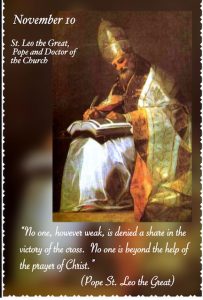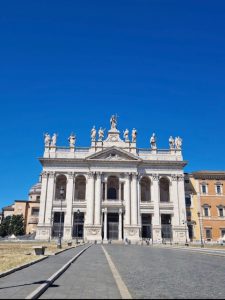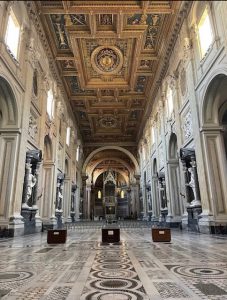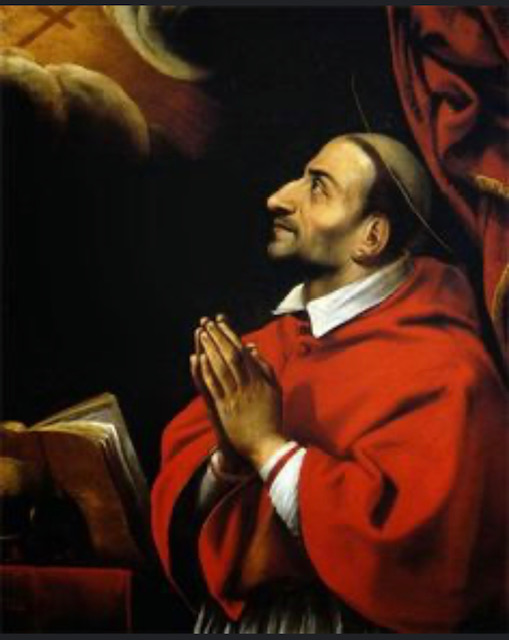Homilía en la Fiesta de Nuestra Señora de Guadalupe
- Apocalipsis 11:19 A – 12:1-10
- Judit 13:18
- Lucas 1:26-38
Estoy feliz de ser invitado a celebrar la misa en honor a la Fiesta de Nuestra Señora de Guadalupe. Algún día (espero pronto), me gustaría ir a peregrinar a la Ciudad de México.
Esta no es solo la fiesta de los mexicanos o latinos sino también de los filipinos. Nuestra Señora de Guadalupe es la segunda Patrona de nuestro país, Amamos a la Santísima Virgen María. ¡Viva, la Virgen de Guadalupe!
Estamos en el Tercer Domingo de Adviento, por lo que debemos regocijarnos. Necesitamos estar alegres y celebrar juntos como sus hijos. Nuestras lecturas nos imploran que estemos alegres y felices porque nuestro Dios amoroso a través de María está entre nosotros. Nuestro querido Salvador Jesús está en medio de nosotros. Sabemos que desde hace varios años no podemos celebrar juntos por el COVID y las incertidumbres que hemos estado enfrentando por la pandemia. A pesar de nuestra situación, todavía hay motivos para celebrar y alegrarnos.
Es importante destacar que estamos llenos de felicidad porque podemos reunirnos nuevamente como devotos de nuestra Señora. De hecho, estamos llenos de gracia y caminamos juntos para mostrar nuestro amor a Jesús y a María, que siempre están presentes para ayudarnos. Yo sé que ella escucha nuestras oraciones, y llora por nuestro canto de las Mañanitas y el himno Guadalupano. Jesús a través de la Santísima Madre de Guadalupe es la razón por la que todos estamos aquí esta noche. Para mostrar nuestro amor fiel, gratitud y devoción.
En este momento, refresquemos nuestra memoria sobre la aparición y el mensaje de la Santísima Madre de Guadalupe. En diciembre de Mil Quinientos Treinta y uno, la Virgen se apareció varias veces en el cerro del Tepeyac a un indio campesino, convertido al catolicismo, llamado Juan Diego. Después de pedirle a Juan Diego que recogiera unas rosas en lo alto del cerro, y luego de acomodarlas en su Tilma, dejó una imagen de sí misma en la Tilma. Y la milagrosa Tilma de casi quinientos años, aún guardada en la Basílica de Nuestra Señora de Guadalupe en México, ha seguido atrayendo a peregrinos y devotos de todo el mundo. Durante dicha aparición, Nuestra Señora de Guadalupe transmitió su compromiso de amor maternal, apoyo y protección para toda la humanidad. Nuestra Señora había hablado con Juan Diego que estaba preocupado por su tío moribundo, le dijo con amorosa preocupación: “¿No estoy yo aquí que soy tu madre? ¿No estás bajo mi sombra y protección? ¿No soy yo tu fuente de vida? ¿No estás en el pliegue de mi manto, en el cruce de mis brazos? ¿Hay algo más que necesitas?”
Creo que mientras continuamos viviendo esta pandemia, junto con sus consecuencias adversas en nuestro trabajo, haciendo vulnerable al mundo de tantas maneras y vidas familiares, este es un mensaje que María, nuestra Madre, quisiera reiterarnos a todos nosotros. Ella quisiera recordarnos hoy, que bajo el manto de su abrazo, no hay nada que temer y preocuparse. Nos hemos asegurado de su aliento para levantar nuestros espíritus de depresión y ansiedades.
Así como la Santísima Madre estuvo presente durante ese tiempo de crisis, todavía camina con nosotros aún más hoy.
Hace quinientos años, el pueblo de México también fue evangelizado por los españoles. En 1531, aún quedaban restos de las prácticas paganas aztecas de ofrecer sacrificios humanos a sus dioses y al mismo tiempo los mexicanos eran oprimidos por los europeos que llegaban a ocupar sus tierras. Nuestra Señora de Guadalupe se les apareció mestiza, hablando y vistiendo como una indígena azteca. Esta Señora que lleva en su seno al único Dios verdadero.
Por lo tanto, por el llamado constante de la Virgen a través de este humilde nativo, San Juan Diego, logró convertir a muchos paganos e hizo su pedido de construir una iglesia donde ella se apareció para que la gente pudiera reunirse para adorar a su hijo e invocar su protección maternal. Hasta el día de hoy, la Basílica de Nuestra Señora de Guadalupe en México sigue siendo el lugar de peregrinaje católico más visitado del mundo y se ha convertido verdaderamente en un lugar de devoción y piedad.
Hoy necesitamos aprender cómo dedicamos nuestras vidas y corazones para encontrar a Jesús a través de nuestra Madre María. Sin una vida de oración constante, no podríamos escuchar sus afirmaciones maternales y no seríamos fortalecidos para estar allí para los demás.
Volvamos a nuestros hábitos de oración y hagamos de Dios el centro de vuestra vida. Solamente así podríamos ser feliz a nuestra Madre en su fiesta. Sabiendo que rezamos, el Rosario, nos confesamos, no solo asistiendo a la misa, sino que recibimos la Sagrada Comunión, ofrecemos sacrificios por la conversión de los pecadores, entonces nuestra vida será ciertamente iluminada y poder gozar de la guía del Espíritu Santo.
Imitemos su amor maternal por todos nuestros hermanos y hermanas y recuperemos una vida que defina la vida de oración como la de la Virgen de Guadalupe, para que podamos estar preparados con sentido y gozo para la venida de su hijo. Que Nuestra Señora de Guadalupe interceda por cada uno de nosotros y nuestras familias.
Madre Nuestra, Virgen de Guadalupe, ruega por nosotros.
¡¡¡¡QUE VIVA LA VIRGEN DE GUADALUPE!!!!
¡¡¡QUE VIVA CHISTO REY!!!
~Padre Arlon, OSA
Homily on the Feast of Our Lady of Guadalupe
I am happy to be invited to celebrate mass for the Feast of Our Lady of Guadalupe. How I wished I can al so go for a pilgrimage in Mexico City someday.
This is not only the feast of the Mexicans, or Latinos but also for Filipinos. Our Lady of Guadalupe is the second Patroness of our country, We love the Blessed Virgin Mary. Viva, la Virgen de Guadalupe!
We are in the third Sunday of Advent, so we need to rejoice. We need to be joyful and celebrate together as her children. Our readings implore us to be glad and happy because our loving God through Mary is among us. Our dear Savoir Jesus is in our midst. We know that for several years we cannot celebrate together because of Covid and uncertainties we have been facing because of pandemic. Despite of our situation, there are still reasons to celebrate and be joyful.
Importantly we are filled with happiness because we can gather together again as devotees of our Lady. We are indeed filled with grace and journey together to show our love for Jesus and to Mary, who always present to help us. I know that she hears our prayers, and cries by our singing of the Mananita and the Guadalupana hymn. Jesus through the Blessed Mother of Guadalupe is the reason why we are all here tonight. To show our filial love, gratitude, and devotion.
This moment, let us refresh our memory about the apparition and message of the Blessed Mother of Guadalupe. In December 1531, our Lady appeared multiple times on the hill of the Piat to an Indian convert and peasant named Juan Diego. After asking Juan Diego to pick some roses on top of the hill, and after arranging them in his pontio, she left an image of herself on the Tilma. And almost five hundred years old miraculous Tilma, still enshrined in the Basilica of Our Lady of Guadalupe in Mexico and has continued to attract pilgrims and devotees from all over the world. During the said apparition, Our Lady of Guadalupe conveyed her pledge of maternal love, support and protection for all humanity. Our Lady had spoken to Juan Diego who was worried about his dying uncle, she said with loving concern, “Am I not here who am your mother? Are you not under my shadow and protection? Am I not your fountain of life? Are you not in the fold of my mantle, in the crossing of my arms? Is there anything else you need?”
I believe that as we continue to experience this pandemic, together with its adverse consequences on our work, making the world vulnerable in so many ways and family lives, this is a message that Mary, our Mother would like to reiterate to all of us. She would like to remind us today, that under the mantle of her embrace, there is nothing to fear and worry about. We have assured us of her encouragement to lift up our spirits of depression and anxieties.
Just as the Blessed Mother was present during that time of crisis, then still she walks with us even more today. Five hundred years ago, the people of Mexico were also newly evangelized by the Spaniards. In 1531, still remnants of Aztec pagan practices of offering humans to their gods and at the same time Mexicans were oppressed by the Europeans who came to occupy their lands. Our Lady of Guadalupe appeared to them as a mestiza, spoke and dressed as a native Aztec. This Lady carrying the one true God in her womb in order to protect and defend against all evils.
Therefore, because of our Lady’s consistent call thru this simple native man, San Juan Diego, became successful converting many pagans and made her request to build a church where she appeared so that the people can gather to worship her son and invoke her maternal protection. To this day, the Basilica in Mexico remains the most visited Catholic pilgrim site in the world and has truly become a center of devotion and piety.
Today we need to learn how we devote our lives and hearts to meet Jesus through our Mother Mary. Without a consistent prayer life, we would not be able to hear her maternal assurances and we would not be strengthened to be there for others.
Let us go back to our prayer habits and make God the center of your lives. That is how we can make our Mother happy on her feast day. Knowing that we pray, the Rosary, go to confession, not just attending the mass but receive the Holy Communion, offer sacrifices for the conversion of sinners, then our life will certainly enlightened and enjoy the guidance of the Holy Spirit so that we will always be safe.
Let us imitate her motherly love for all our brothers and sisters and to regain a life defining prayer life that of hers, so that we may be bore meaningfully and joyfully prepared for the coming of her son. May Our Lady of Gudalupe intercede for you and your family. Be safe and God bless you.
Our Lady of Guadalupe, pray for us. Viva La Virgen de Guadalupe! Viva Cristo Rey!
Fr. Arlon, osa
